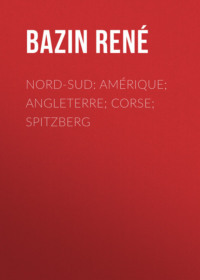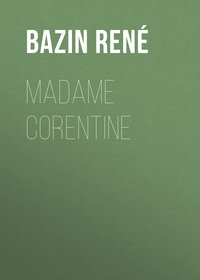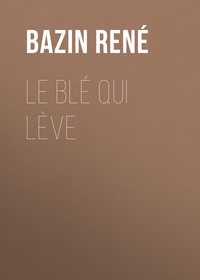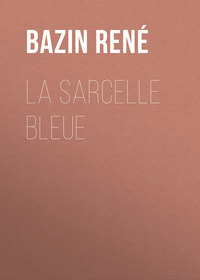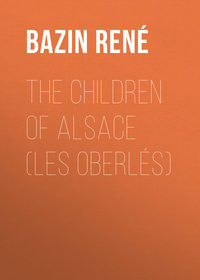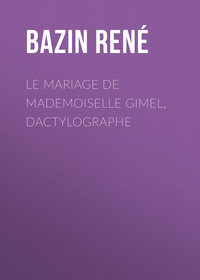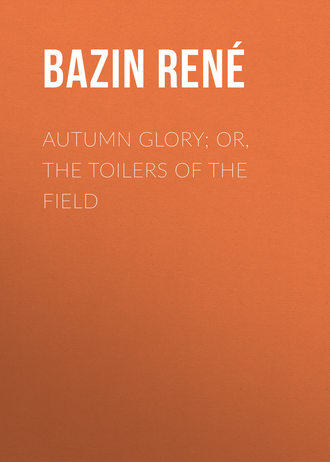 полная версия
полная версияAutumn Glory; Or, The Toilers of the Field
"Father no longer talks against him," thought she. "He even defended him once to Mathurin. As for me, he has never found me complain, nor refuse to do the work I had to do, and I think he is pleased with me for having done my best. If André were to settle down now, and to bring a wife to La Fromentière, perhaps father would not refuse to let me marry. And I begin to think that Master André has his reasons for absenting himself on Sundays, and going off to Saint Jean, Perrier, and Saint Gervais, as he does…"
She smiled. Her eyes had taken the colour of the fresh straw that surrounded her. Far away, on the road to the meadows, she saw a fine strapping youth walking with swaying movement, carrying over one shoulder a pole to jump the dykes with.
"Driot," she murmured. "I will tease him about his Sunday walks."
Soon she saw André come up the hill, skirt the dwarf orchard, then pass between the leafless hedges in the road. When he was at a little distance, she coughed to attract his attention. He looked up. His face which had worn an anxious expression cleared; instead of continuing his way to the courtyard of La Fromentière, he jumped over into a small field that ran beside it, passed the row of hives where the bees were sleeping their winter sleep, and stopped beside Rousille in the threshing-floor, leaning on his pole. As he did so, he endeavoured to assume the half-bantering, half-protecting air he usually adopted towards his sister, thinking himself obliged to laugh with her as with a child.
"I was looking for you," he said.
"Oh, you were looking for me very badly then. Your head was bent down. I believe you were thinking of someone else than me."
"Indeed!"
"Yes. Where do you come from with your pole, you roamer? Not from vespers?"
"No, from Saint Jean. The water is grand, and jolly cold. On the other side of Le Perrier there are inundations on both sides of the road."
"You have been calling at the farms, I suppose. Did you stop at La Seulière?"
"You do not know me one bit; do you think I should go against…"
He was about to say "against the intrigues of Mathurin, who has returned to his former infatuation," but he stopped short.
So happy herself that she did not notice his reticence, she resumed:
"To the Levrelles? No? Then to the mill of Moque-Souris, where there is that pretty little Marie Dieu-donnée, the prettiest miller's daughter between here and Beauvoir?"
"Still wrong."
Trying to be grave, but without succeeding in hiding the joy that pervaded her whole soul, she resumed:
"You see, I want you so much to marry, André. And such a dear boy as you are, I think it would be easy. Indeed, you have no idea how greatly I wish it!"
André's face grew careworn again as before, and he said:
"On the contrary I know very well…"
"No. You always think of me as a child. But I am twenty, Driot. I know when others are unhappy. You, for instance, are grieving over our François; you miss him even more than father does. If you were to marry, you would forget your sorrow a little. Settled down at La Fromentière, married to a girl you love, your thoughts would no longer be brooding over the past as now."
"And above all," put in André, "there would be a housekeeper here, and little Rousille could marry her faithful swain."
Pressing herself back against the rick with a girlish movement of shoulders, head, and arms, Rousille raised herself and knelt forward the better to reach her pocket. Bending over the aperture hidden amongst the innumerable folds of her dress, she extracted the letter and gently held up the square of paper to her brother, raising it to the level of her head and following it with her eyes as she did so.
"I would show it to no one but you, André … read my letter … I want to prove that I have confidence in you. And then you will understand how light it makes one's heart to receive such a dear letter, so light that one feels like air. It will make you want to receive such an one yourself."
André took the letter without showing the slightest impatience, and without a word of thanks. But as he read, he grew moved, not with jealousy of such love, but with pity for the girl, who was dreaming her dream of happiness between two misfortunes.
For he had definitely decided to leave the farmstead and La Vendée. Some tidings, in a measure foreseen, dreaded for some time past, very serious for La Fromentière, had caused him to come to a decision that very afternoon. He had returned home, sorrow stricken, weighing all the pain he was about to cause; and now coming upon this joy, this hope of Rousille's, those eyes that persisted in smiling at life, that flower of the ruined farmstead, the feeling came over him that he must spare the child, at least, that one evening, and not tell her at once all he knew.
Having read the letter he slowly folded it, and gave it back to Rousille, who, impatient for an appreciative comment, her whole soul in her eyes, her lips breaking into a smile, asked:
"Do you think that father would consent, if you were to marry, and if you spoke for my Jean?"
"Would you go to live in the Bocage, Rousille?"
"I should have to on account of Mathurin, who would never suffer us near him."
She was surprised at the manner in which André looked at her, so gravely and so tenderly. Taking her hand in both of his, her hand which still held the letter, he said:
"No, little Rousille, I will not speak for you. But I will shortly do something else, of which I cannot tell you now, and which will avail you. The day I do it, your marriage will be assured, unless father breaks up everything… And it will not be at the Bocage that you will make your home, but at La Fromentière, in our mother's place – the dear mother with whom we were so happy in the days of our childhood. Put your faith in what I say, and do not worry about Mathurin."
Letting go her hand, which fell to her side, he added:
"I have an idea that you, at least, will be happy, Rousille."
She opened her lips to speak; he made her a sign that he would say no more. All the same Rousille asked hurriedly, seeing him move away:
"One thing only, André, tell me only one thing. Promise me that you will always till the ground, for father would be so grieved…"
And he answered:
"I promise you, I will."
Rousille watched him as he went round the corner, and on into the courtyard. What was the matter with him? What meant those mysterious words? Why had he spoken the last so sadly? For a moment she wondered; but the trouble was evanescent. Scarce had solitude returned about her, than Rousille heard again the words of her love-letter singing their soft refrain to her. They came into her heart, one by one, like transparent waves, each opening out in its turn and covering the shore. "It cannot be a very important secret," thought she, "since Driot will continue to till the ground, that will make father happy, and I shall be happy too."
She recalled the smile that had passed over her brother's face, and thought: "It is nothing," and peace, entire, unquestioning, returned to her.
In the twilight of that winter afternoon on the borders of the Marais of Sallertaine, for one short hour there was a girl who smiled at life, and deemed that bad times were past and gone. She was still smiling, still sheltered in her retreat amid the straw, when André accosted his father, coming in from the Sunday tour of inspection, with:
"Everything is certainly going to the bad, father."
The farmer, his head full of the promise of hay and wheat harvests he had just been examining, answered contentedly:
"No, everything is coming up well. The spring crop of oats is promising; what is going to the bad?"
"I heard at Saint Jean-de-Mont that there is to be a sale of the furniture at the Château, father!"
For a moment Toussaint Lumineau could not take it in.
"Yes, all the furniture," repeated André. "It is advertised in the papers. See, if you don't believe me, here's the list. Everything is to be sold."
He drew a paper from his pocket, and pointed with his finger to an advertisement, from which the old farmer laboriously read:
"On Sunday, February 20th, Maître Oulry, notary at Chalons, will proceed to sell the furniture of the Château de la Fromentière. There will be sold: the entire drawing-room and dining-room furniture, old tapestries, oak chests, pictures, beds, tables, china and glass, wines, guns, contents of the library, wardrobes, etc."
"Well?" exclaimed André.
"Oh," returned his father, "who would have foretold this eight years ago? Have they become poor, then, in Paris?" He fell into silence, not willing to judge his master too hardly.
"It is ruin," said André. "After the furniture, they will be for selling the land, and us with it!"
The head of La Fromentière, the successor of so many farmers under the same masters, was standing in the middle of the room; he raised his weary eyes until they rested upon the little copper crucifix hanging at the head of his bed, then let them fall again in sign of acceptance.
"It will be a great misfortune," he said, "but it will not hinder our working!"
And he went out, perhaps to shed tears.
CHAPTER XIII.
THE AUCTION
In the ensuing week the coming sale at the Château was the frequent subject of discussion among the men of La Fromentière. André openly attacked the masters.
"They are ruined," he said. "All the nobles go the same road, because they do nothing. So much the worse for them!"
"So much the worse for the farmers," replied his father; "they do not often gain much by changing masters."
Toussaint Lumineau was painfully hit by the coming event, not only in his sincere and lifelong affection for the master's family, but in his honest pride as a peasant.
It was a humiliation to hear people talk of the downfall of the family to whom the Lumineaus were allied by traditions of generations; he took his share of the blame, his share of the disgrace; he felt he had lost stability, that in future he must be exposed to chances and changes, like so many another; and even found himself envying those whose farms belonged to wealthy proprietors, clear of mortgage.
"No," he resumed, "you do wrong to speak as you do, Driot. Our masters may have their reasons for this, of which we know nothing. Perhaps M. le Marquis is about to marry his daughter, and is in want of ready money. Rich and poor alike find it an expensive business to settle their children."
"If that is their only means to obtain money, they must be at a pretty low ebb!" rejoined André. "To think that even family portraits are to be sold. I remember seeing them one day when I went with you to pay the rent."
"Bah! Perhaps they were not good likenesses. Besides, the Marquis probably has others. How are people in our station in life to know all that families like theirs possess?"
"And personal clothing? Is that usually sold? It is not very creditable in them to let everything go in a public sale, as if they were bankrupts."
"I tell you what, André, I do not believe that half the things will be sold that are down in the catalogue; it is merely to draw people." But all the same, in his heart of hearts, the farmer well knew how poor were the reasons which respect for the family led him to urge.
Rising from the table, under pretext of having work to do, he shortened the meal.
André's aggressiveness did not lessen, indeed his irritation seemed to increase as the day fixed for the sale approached. The poor lad needed to anger himself against something or somebody to gain courage. February 20th was the date on which he had secretly planned to leave La Fromentière, four days before the departure of an emigrant ship that he was to join at Antwerp. His anger was inspired not by temper, but by the ever-increasing grief within him. He forced himself to speak ill of La Fromentière because he still loved it, and was about to desert it.
Thus Sunday, the 20th of February, arrived. On that day the silence that had reigned over La Fromentière vanished, but to give place to what noises – what clatter! Visitors were again seen within its walls, but what visitors! People had come from afar, curiosity dealers from Nantes, from La Rochelle, even from Paris. Before eight in the morning they had gathered in groups beside the two flights of steps leading to the portico. Men, short, stout, red-faced; some with auburn beards, others with bird-like noses, talking together in subdued voices, sitting on chairs – to be sold – that had been ranged in rows on the broad carriage drive, laid with the red gravel that used to crunch so pleasantly beneath the roll of carriage wheels. On the topmost of the entrance steps, now converted into an auctioneer's rostrum, were the notary, Maître Oulry, his eyes displaying discreet satisfaction behind his spectacles, the public crier, indifferent as any stone-breaker to the relics of which he was about to announce the dispersion, and the furniture removers standing in their shirt-sleeves despite the intense cold. The two flights of stone steps, stained with mud even to half way up the balustrades, testified to the crowds admitted on the previous two days to see the interior of the Château. Some had gone from curiosity, taking advantage of their first opportunity to go over a seigniorial dwelling; but all within was in disorder, faded, covered with dust. The battens, which for years had secured the windows of the rooms on the ground-floor, had been unnailed on one side, and hung down beside the open persiennes. In the dining-hall, and the two drawing-rooms en suite, had been piled the greater part of the bedroom furniture, cooking utensils, and crockery. Pictures, turned with their faces to the wall, formed a dado in front of couches and easy-chairs; there were four clocks on one mantel-piece, candelabras standing in fireplaces, fire-dogs on occasional tables, book shelves on the billiard table, baskets of choice wine standing in the boudoir of the dowager Marquise, hung with its dainty cherry-coloured satin; silk draperies trailing on a kitchen table. Broken bell-ropes and strips of torn paper hung from the walls. Everywhere was disorder and desolation as complete as is produced by Death in the human frame.
Pushing their way through the narrow passages left by all these piles of costly objects were to be seen coarse men accustomed to the handling of rags and rubbish, discharged servants, dealers in old clothes, coffee-house keepers covetously fingering carved oak chests, scratching the gold off picture frames to see how deep it was laid; opening cupboards and drawers, and bursting into rude loud laughter if, perchance, they lighted upon some private token, such as photographs, letters, missals, rosaries, relics of departed souls thus exposed to, and profaned by vulgar eyes.
On the upper floors boys in their sabots had perched themselves on the window-sills with legs hanging out, or were trying the mattresses still left on their wooden bedsteads. Gradually as the late February day dispersed the fog, and it was drifted by the wind in heavy masses over the woods, vehicles of all descriptions – cabriolets, victorias, tilburys, closed carriages formerly graced with armorial bearings, now let out on hire, mixed with some few well-appointed turn-outs – drove into the park. These were unharnessed, the carriages standing upon the lawns, some of the horses tied to the trees with nosebags of hay; while others, their feet clogged, were left to graze where they would. A row of carts stood on the border of a neighbouring copse, their shafts raised diagonally.
All round the Château was like a fair; the stables and coach-houses had been appropriated; plough horses were to be seen in the loose boxes; coachmen and stable-boys from inns, in their straw hats, gazed admiringly at the vast proportions of the stables and dependencies, or stood hypnotized before the copper appointments of the stalls, the nickel locks, the iron bars separating one from the other.
"It was a fine place after all," they said to themselves.
The sight of all the careful appointments seemed to give them a vague insight into the ancient splendours of the domain, while at the same time it came across them with stupefying force: how could a man have lost such a fortune? how could there be ruin, with a rental of hundreds of thousands of pounds? And, as a natural consequence, they gave the family credit for vices which had but a very small share in the disaster, for, spitting on the cemented floors, they exclaimed: "A pleasure-loving set!"
In front of the entrance the crowd increased rapidly, some impelled by the desire to buy, others by curiosity. Three hundred people, seated on chairs and benches, formed a compact, immovable, semicircular mass; outside them was perpetual movement of coming and going. Dealers in antiquities, sellers of old clothes, occupied the first row; after them came a number of shopkeepers, former purveyors to the Marquis, householders of Chalons with their wives, country dames dressed up as if for Easter Day, with bright eyes and loud voices, wearing little bunches of spring flowers in their bodices which they themselves had cut from the hot-houses of La Fromentière, given up this day to pillage. They commented derisively to each other on the ill-kept state of the apartments in the Château, the dirty windows, the grass-grown avenues, the bogs in the cross roads of the park. "We keep things very differently," said they. "Thank goodness, we know better what is fitting than your ruined Marquises do!" And with an air of "knowing all about it," they called up memories of bygone fêtes. Behind them, again, were to be seen peasants of Saint Gervais, of Soullans, of Saint Urbian, but men only. Very few had come from the parish itself. The auction was not for them; what should take them there? To many who had known the family, it had seemed as if it would have been an insult to assist at the humiliating spectacle. At the most some ten of the old inhabitants of Sallertaine were there, and they not the most important, keeping well at the back, not daring to sit down. Shamefaced, as though the lord of the Château were there before them and sorrowful, they had followed the crowd, having nothing else to do in their Sunday leisure, and now exchanged recollections of kind words spoken by "Monsieur Henri," of greetings and girlish smiles given by Mademoiselle Ambroisine. Alas! after all the money so lavishly spent, so many a kindly action, so much cordiality and urbanity shown for centuries past by successive Marquises of La Fromentière – after eight years there only remained that slight expression of regret to be seen in the sad faces of a handful of farmers.
Still fewer in number were the neighbouring gentry. Hidden among the throng was the Baron de la Houvelle, whose mania for collecting led him to forget what was due to his rank; the Comte de Bouart, coarse and red-faced, attracted by the wine cellar, and young d'Escaron, whose object was to secure a breeding mare.
But the notary had many commissions to buy; for earlier in the week, before the day on which the Château had been on view to the invasion of plebeians, châtelaines, young and old, friends of the family, had driven over and, shown round by the game-keeper, might have been seen in private apartments and reception rooms, examining old tapestries and household linen with many an exclamation and regret.
Only one member of the Lumineau family was present at the auction, and that was Mathurin, to whom every event, even of a painful character, was a grateful change to his sufferings and weariness. When he had announced "I shall go," his father had said:
"I could not; it would irritate me too much. Go if you like; and when they come to selling personal things, send me word, Mathurin, for I want some little thing as a remembrance of M. le Marquis."
At some distance from the circle of buyers, to the left of the entrance, Mathurin Lumineau had found a seat under a group of trees. Wrapped in his brown cloak, more taciturn and brooding than ever, he had gradually pushed back his chair until he was almost hidden between the branches of two fir-trees, thence, as if lying in ambush, he listened to all that was going on, and his blue eyes, ever and anon lit up with sudden anger, scanned the front of the Château, now the buyers, now the passers-by.
At half-past eight the auction began. The auctioneer, a small bloodless man, endowed with a strong voice, announced from the top of the entrance steps to the crowd assembled, to brute nature, to the forests left for the past eight years to solitude and silence:
"The reception-room furniture of M. le Marquis, comprising six fauteuils, a couch, four ebony chairs upholstered in old gold satin, Louis XV. style, with gilt nails, for fifteen hundred francs; the covers will be thrown in. Going at fifteen hundred francs! Fifteen hundred and twenty; fifteen hundred and fifty; sixteen hundred." He rolled his eyes as the price augmented.
At sixteen hundred francs, the old gold satin suite was knocked down; and while the notary was putting the curtains up for auction, Mathurin's eyes followed the fauteuils, couch, and chairs he had only seen once before and that by chance on a quarter-day, now being carted away by the furniture removers who fell at once on these the first spoils. After the contents of the reception rooms followed tables, wardrobes, beds, these latter especially coveted; crockery, covered with dust and displayed to view on the steps, clocks, the billiard table.
The sale lasted the whole day, save a short interval at half-past ten. The auctioneer's voice was untiring. As people went, their places were taken by new-comers; the pale rays of the February sun lighted up clouds of dust issuing from the open windows; the rooms were thronged. Many of the purchasers were carrying away their lots themselves; others, who were only later to come into possession of their acquisitions, were writing their names in chalk on old oak chests, or pieces of furniture, covered for the time being with heaps of incongruous articles. Costly hangings, partly unnailed, hung from the cornices, and streaming over step-ladders, trailed on the dusty floors.
Towards four o'clock, the number of spectators had diminished; tethered horses had been taken from under sheltering trees; vehicles of all kinds and descriptions were on the homeward way to town and outskirts. Mathurin had not left his nook under the shade of the fir-trees. An uneasy suspicion was agitating him violently. Twice, at some distance in the direction of the offices, he had thought to recognise the eager face of Jean Nesmy. The young man, clad in brown, his hat drawn over his eyes, who only stealthily advanced, but who had been seen by Mathurin now here, now there in the copse on the other side of the lawn, could be no other than the dismissed farm-servant, Rousille's lover.
Mathurin sat and waited for his father, to whom he had despatched a village lad, telling him of the approaching close of the sale. In the bluish mist, to right of the Château, Farmer Lumineau appeared, and with him Marie-Rose. Despite the growing dusk, both were somewhat shamefaced. Rousille did not go far, at a hundred paces from the front of the Château she stopped, and sitting on the bench of la Marquise, looked on with startled eyes at the scene of devastation, while her father went up closer to make his purchase. Among the two hundred people still grouped round the granite steps, women predominated. They had stayed to see the "wearing apparel and toilet appurtenances," given out by the notary as being the next lot. And now the auctioneer lifted above his head a soft, clinging, pale violet material, that unfolded and fluttered in the wind.
"A young lady's dress of mauve silk with muslin collarette – ten francs!" he called.
"Show it!" cried the women's voices.
And Rousille saw the object lowered on to the stone steps, the little silken gown left behind, forgotten, that still retained something of the supple grace of its wearer, Mademoiselle Ambroisine de la Fromentière. And coarse words and low jests reached her, made by the brokers as they handled the dainty relics of refinement and purity.
"Can they put up that for sale!" she murmured; she shrank from the profanation, and would gladly have gone away.
But at that moment two sudden emotions, two surprises nailed her to her seat. Across the lawn, facing her, in front of a group of fir-trees, she had seen Mathurin, who had left the protection of the branches, and was looking over at the bench of la Marquise, shaking his fist; while, quite close behind her, she heard a voice from out the flowering laurels, say:




